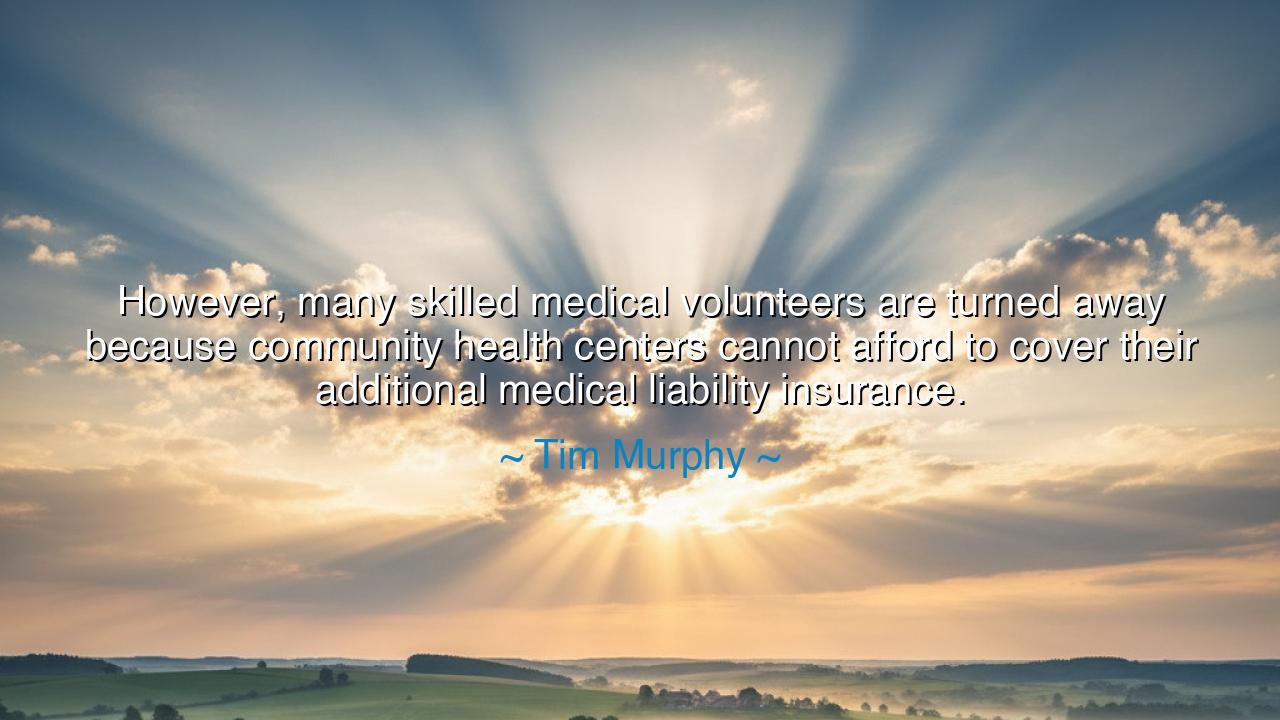
However, many skilled medical volunteers are turned away because
However, many skilled medical volunteers are turned away because community health centers cannot afford to cover their additional medical liability insurance.






In the voice of Tim Murphy we hear a lament both practical and profound: “However, many skilled medical volunteers are turned away because community health centers cannot afford to cover their additional medical liability insurance.” What seems a statement of policy is, when read deeply, a testimony to the tragedy of wasted compassion. For here we see not a lack of healers, nor a lack of need, but a chasm carved by law and cost, where willing hands are stilled though suffering abounds.
The presence of medical volunteers is itself a blessing. These are men and women who, though they might have chosen comfort or ease, instead offer their skills freely, to bind the wounds of the poor, to serve the forgotten, to be physicians not for wealth but for love of humanity. Yet the structures of our world, instead of welcoming them with open arms, place barriers in their path. The demand for liability insurance, a shield against the fear of legal peril, becomes a wall that blocks mercy itself. Thus, what could have been healing becomes frustration, and what could have been hope becomes silence.
Consider the community health centers, those humble outposts of care where the vulnerable come. They are not gleaming palaces of medicine but often modest clinics, stretched thin, serving many with little. To them, every coin counts, every resource must be weighed. When faced with the burden of insuring more volunteers, they must choose between what is possible and what is good—and too often, the good is left undone, not because hearts are unwilling, but because coffers are empty. This is the bitter truth Murphy names.
History bears witness to similar tragedies. During the Irish famine of the nineteenth century, ships laden with food sometimes stood in harbors while people starved, not for lack of bread but for lack of coin to purchase it. So too here: it is not the absence of healers that afflicts us, but the chains of cost that bind their service. The lesson is clear—humanity’s suffering is too often not the fruit of scarcity, but of barriers we ourselves have built.
And yet, within Murphy’s words there is also a call to vision. Imagine a system where the medical volunteers were free to serve, their liability covered by the larger community, by the state, or by collective effort. Imagine the multiplied strength of healers rushing to the aid of the sick, unshackled from fear. Such a vision is not impossible. In times of war and disaster, nations have rallied to create such conditions, for then the urgency of need outweighs hesitation. Why not, then, extend the same urgency to the quiet disasters of poverty and neglect?
The teaching for us, my children, is that we must learn to see beyond the narrow walls of regulation and finance, and remember the higher law: that the sick must be healed, and that no willing hand should be turned away from the work of mercy. In our own lives, though we may not decide the fate of insurance policies, we can act with the same principle. Support the centers of care, advocate for systems that remove barriers, and where possible, become volunteers ourselves—in medicine, in teaching, in community—ensuring that generosity is never left idle.
For in truth, the greatest tragedy is not the absence of skill, but the silencing of those who wish to serve. Let us not waste compassion; let us not chain willing healers with burdens they cannot bear. Instead, let us build structures that welcome, protect, and empower them. Thus will Murphy’s warning be transformed into hope, and the day may come when every medical volunteer finds their place in the circle of healing, and every community, no matter how humble, feels the full strength of human mercy.






AAdministratorAdministrator
Welcome, honored guests. Please leave a comment, we will respond soon